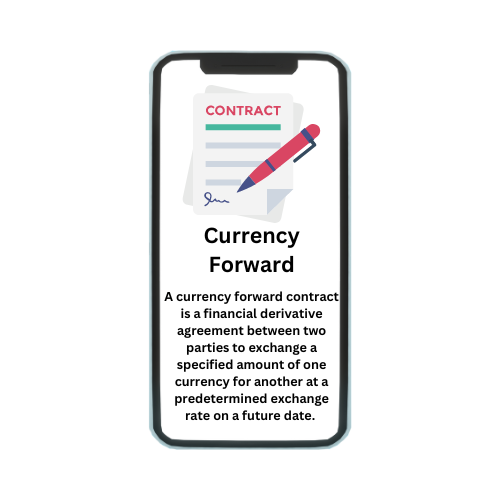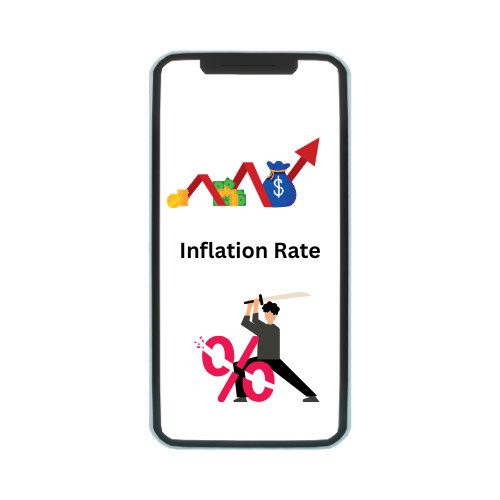A currency forward contract is a financial derivative agreement between two parties to exchange a specified amount of one currency for another at a predetermined exchange rate on a future date. Unlike spot transactions, which involve immediate exchange, forward contracts are customized and allow businesses or investors to lock in an exchange rate for a future transaction, thereby hedging against the risk of currency fluctuations. These contracts are typically used by multinational corporations, exporters, and importers to protect against adverse movements in exchange rates, ensuring cost predictability and safeguarding profits. Unlike standardized futures contracts traded on exchanges, forward contracts are over-the-counter (OTC) instruments, meaning they are privately negotiated and tailored to meet the specific needs of the parties involved, offering flexibility in terms of contract size, maturity date, and currencies involved.
How Currency Forwards Work
- Agreement Between Parties: Two parties agree to exchange a specific amount of one currency for another at a future date, with the exchange rate fixed at the time of the agreement.
- Customization: The contract is tailored to meet the specific needs of the parties, including the amount of currency, the exchange rate, and the settlement date.
- Hedging Against Risk: Businesses or investors use currency forwards to hedge against the risk of adverse currency movements, allowing them to lock in a favorable exchange rate and protect against potential losses due to fluctuations.
- No Immediate Exchange: Unlike spot transactions, where currencies are exchanged immediately, the actual exchange in a forward contract occurs on the agreed future date.
- Over-the-Counter (OTC) Market: Currency forwards are traded OTC, meaning they are privately negotiated rather than traded on an exchange, providing greater flexibility but also introducing counterparty risk.
- Settlement: On the maturity date, the currencies are exchanged at the agreed-upon rate, regardless of the current market rate, ensuring price certainty for both parties.
- Counterparty Risk: Since there is no central clearinghouse involved, there is a risk that one party may default on the contract, making counterparty assessment crucial in these transactions.
Example: Suppose a U.S. company expects to receive 1 million euros in six months. To avoid the risk of the euro depreciating against the dollar, the company can enter into a currency forward contract to sell 1 million euros for dollars at a fixed rate, six months from now.
Key Components of a Currency Forward
- Contract Parties: The two parties involved in the agreement—typically a buyer and a seller—who agree to exchange currencies on a future date.
- Notional Amount: The specific amount of currency to be exchanged, which is agreed upon at the time of entering the contract. This amount determines the size of the forward contract.
- Forward Rate: The agreed-upon exchange rate at which the currencies will be exchanged on the contract’s settlement date. This rate is fixed when the contract is created, providing certainty regardless of future market fluctuations.
- Settlement Date: The future date on which the currency exchange will take place. This date is specified in the contract and can be tailored to the needs of the parties, ranging from days to years in the future.
- Currency Pair: The two currencies involved in the exchange, such as USD/EUR. The contract specifies which currency is to be delivered and which currency is to be received.
- Counterparty Risk: The risk that one party may default on the contract, given that currency forwards are typically over-the-counter (OTC) and lack a centralized clearinghouse to guarantee the transaction.
- Contractual Terms: The specific terms and conditions agreed upon by the parties, including any provisions for early termination, extension, or adjustments to the contract, which add flexibility but require careful negotiation.
Types of Currency Forward Contracts
- Fixed-Date Forward: A contract with a specific settlement date on which the currency exchange will occur. This is the most straightforward type of forward contract, where the exchange happens exactly on the agreed-upon date.
- Option-Style Forward: Offers flexibility by allowing one party the option to choose the exact date within a specified range when the currency exchange will take place. This type is useful when the future payment date is uncertain.
- Window Forward Contract: Allows for the exchange of currencies on any date within a predetermined period, rather than on a single, fixed date. This provides flexibility for companies that may need to settle transactions over a range of dates.
- Non-Deliverable Forward (NDF): A type of forward contract used when one of the currencies involved is not freely traded or is subject to exchange controls. In an NDF, the contract is settled in cash rather than through the physical delivery of currencies, with the settlement based on the difference between the agreed forward rate and the prevailing spot rate at maturity.
- Flexible Forward: A contract that allows the buyer or seller to exchange currency in portions at multiple intervals during the contract period, rather than in one lump sum. This is useful for companies that have ongoing payment obligations in foreign currency over time.
- Long-Dated Forward: A forward contract with a maturity date that extends significantly beyond the typical time frame, often used by companies with long-term currency exposure. These contracts can last several years, offering protection against long-term currency risks.
Currency Forward vs. Currency Futures
Feature | Currency Forward | Currency Futures |
Market Type | Over-the-Counter (OTC) | Exchange-Traded |
Customization | Highly customizable (amount, maturity date, etc.) | Standardized contract terms (amount, dates, etc.) |
Settlement Date | Specific date agreed upon by the parties | Standardized settlement dates (e.g., quarterly) |
Contract Size | Tailored to the needs of the parties involved | Standardized contract sizes |
Counterparty Risk | Higher risk due to lack of centralized clearing | Lower risk due to clearinghouse guarantee |
Liquidity | Generally lower liquidity; depends on the market | Higher liquidity due to exchange trading |
Regulation | Less regulated, as it’s a private agreement | Heavily regulated by exchanges and authorities |
Mark-to-Market | Not typically marked to market; settled at maturity | Marked to market daily, with margin requirements |
Pricing | Based on the spot rate plus/minus a forward premium or discount | Determined by supply and demand on the exchange |
Usage | Often used for hedging specific, non-standardized transactions | Commonly used for speculation and standardized hedging |
Benefits of Using Currency Forwards
- Hedging Against Currency Risk: Currency forwards allow businesses and investors to lock in an exchange rate for future transactions, effectively protecting against adverse currency fluctuations and stabilizing financial outcomes.
- Customization: These contracts can be tailored to the specific needs of the parties, including the amount of currency, the settlement date, and the currencies involved, offering greater flexibility than standardized instruments.
- Cost Predictability: By securing a future exchange rate, currency forwards help businesses manage their budgets and forecast cash flows with greater accuracy, reducing uncertainty in financial planning.
- No Initial Payment Required: Typically, no upfront payment is required to enter a currency forward contract, allowing companies to hedge currency risk without tying up capital.
- Mitigation of Transaction Risk: For companies involved in international trade, currency forwards can minimize the risk associated with unfavorable exchange rate movements between the time a deal is signed and when it is settled.
- Over-the-Counter Flexibility: As an OTC instrument, currency forwards offer privacy and can be structured to meet the unique requirements of the parties, unlike exchange-traded futures.
- Effective for Long-Term Hedging: Currency forwards can be used for long-term hedging, providing protection over extended periods, which is particularly beneficial for companies with long-term foreign currency exposure.
Risks Associated with Currency Forwards
- Counterparty Risk: Since currency forwards are over-the-counter (OTC) contracts, there’s a risk that the other party may default on the agreement, potentially leading to financial losses if the contract is not fulfilled.
- Liquidity Risk: Currency forwards are not traded on an exchange, which can result in lower liquidity, making it difficult to exit or modify the contract before its maturity if market conditions change.
- Mark-to-Market Risk: Although currency forwards are not typically marked to market daily, significant changes in the underlying currency’s value can lead to substantial unrealized losses, affecting a company’s balance sheet.
- Lack of Regulation: Being OTC instruments, currency forwards are less regulated than exchange-traded products, which can increase the risk of disputes and make it harder to enforce the contract.
- Market Risk: The underlying currency’s value might move unfavorably against the position taken in the forward contract, potentially leading to financial losses if the locked-in rate is worse than the prevailing market rate at settlement.
- Inflexibility: Once a currency forward contract is entered, it is binding, meaning the parties are obligated to complete the transaction at the agreed-upon rate, even if market conditions have changed favorably.
- No Daily Settlement: Unlike futures contracts, currency forwards do not have daily settlements, which can lead to a large final payment obligation at maturity, potentially straining cash flow if not properly managed.
- Operational Risk: Managing and settling currency forward contracts involves complex administrative tasks, including tracking contracts and ensuring proper execution, which can introduce the risk of errors and operational inefficiencies.
Practical Examples of Currency Forward Contracts
- International Trade: A U.S. company exporting goods to Europe agrees to a currency forward contract to sell €1 million and buy USD at a fixed rate of 1.10 USD/EUR, settling in six months. This locks in the exchange rate and protects the company from potential depreciation of the euro, ensuring it receives a predictable amount in USD.
- Multinational Corporations: A multinational corporation with operations in multiple countries uses currency forwards to hedge its exposure to fluctuating exchange rates. For instance, it might enter into a forward contract to buy JPY and sell USD to cover future expenses in Japan, thus mitigating the risk of adverse currency movements.
- Investment Management: An investment fund with holdings in foreign assets might use currency forwards to hedge against currency risk. For example, if the fund holds European stocks and expects to repatriate the investment in six months, it might enter a forward contract to sell EUR and buy USD, protecting the fund from potential EUR depreciation.
- Tourism and Travel: A travel agency planning a large overseas event might use currency forwards to lock in exchange rates for future payments. For instance, if the agency needs to pay €500,000 for venue bookings in Europe in six months, it could enter into a forward contract to purchase euros at a fixed rate, ensuring the cost is predictable and not subject to currency fluctuations.
- Corporate Treasury Management: A corporation with future debt obligations in a foreign currency might use currency forwards to manage its cash flow and budget effectively. For example, if a company has a €10 million bond maturing in a year, it might enter into a forward contract to buy euros and sell USD, thereby locking in the cost of repayment and reducing uncertainty.
Conclusion
In conclusion, currency forward contracts are essential tools in the realm of financial risk management, offering businesses and investors a strategic means to mitigate the uncertainties associated with fluctuating exchange rates. By allowing parties to lock in a specific exchange rate for a future date, these contracts provide valuable protection against adverse currency movements, ensuring cost predictability and stabilizing cash flows. The ability to customize the terms of forward contracts makes them particularly versatile, accommodating various needs from international trade and corporate treasury management to investment hedging and travel planning. However, it is crucial to be mindful of the associated risks, including counterparty risk, liquidity issues, and operational complexities. Despite these challenges, the benefits of currency forwards—such as enhanced budget stability and effective hedging—underscore their importance in global financial operations. As with any financial instrument, careful consideration and management are key to leveraging currency forwards effectively and safeguarding against potential pitfalls.








